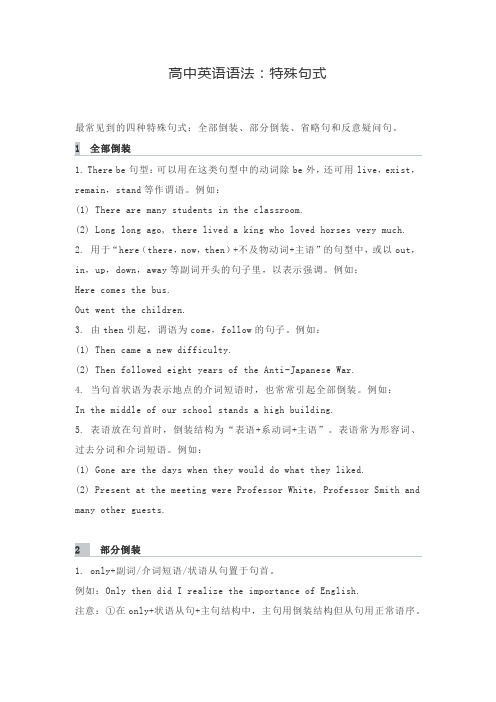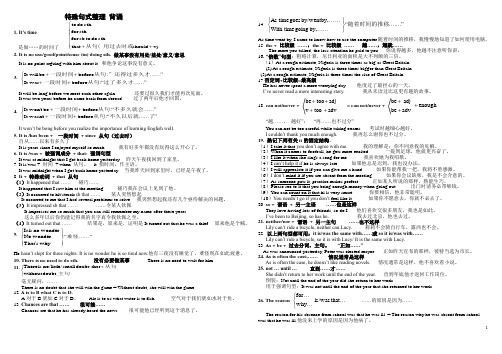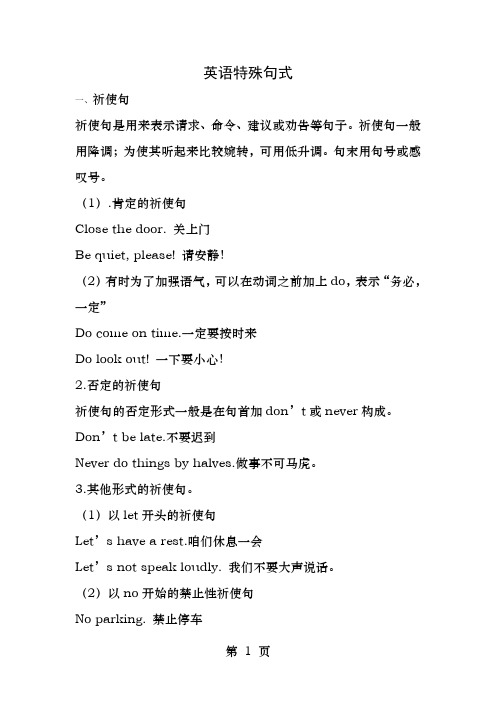英语特殊句型
英语特殊句式

英语特殊句式特殊句式(省略、倒装句、强调句)◆省略是一种修辞手法,用于避免重复一、简单句中的重复1. 省略主语1). 祈使句中主语的省略*(You)don’t touch me.不要碰我*(You)pass me the ticket, will you?把票递给我,好吗?* Beg your pardon.对不起,请原谅。
2. 省略谓语【经济学人高频】*Some of us studyEnglish; others (study) French.3. 疑问句的简略回答。
——Are you adoctor? 你是医生吗?——Yes, I am (adoctor). 是的,我是。
4. 感叹句中的省略。
*What a good time(we had) yesterday!昨天我们玩得很开心!5. 特殊疑问句中的省略(只对所问作针对性的回答)。
——Which book doyou want? 你想要哪一本书?——The one on thedesk. 书桌上的那本。
6. 所有格后的名词表示处所时,可以省略。
*He stayed at hisuncle’s (house) rather than mine in hischildhood. 他小时候住在叔叔家,而不是我家。
二、并列句中的省略1). 省略共同的主语或宾语。
*Mr Smith pickedup a coin on the road and (Mr Smith) handed it to a policeman. 史密斯先生在路上拾起一枚硬币,并把它交给了一位警察。
2). 若主语不同而其后的助动词、情态动词相同,则省略后面的助动词或情态动词。
*Jack must have beenplaying football and Mary (must have been) doing her homework. 杰克肯定一直在踢足球,玛丽在写作业。
3). 若句子中前半句与后半句的主语与谓语动词相同,则省略后面的谓语成分。
英语的特殊句式

英语的特殊句式英语中有一些特殊的句式结构,以下是几个常见的特殊句型:强调句型 (Emphatic Structure)通常采用"It is/was + 强调部分 + that/who + 其他部分"的结构。
示例:It was in China that Tom first met Mr. Lin.It's not what he said but the way he said it that matters.否定词“not”与“until”的强调用法当用于时间状语从句时,"not until"位于句首构成倒装结构以强调时间点。
正常句:He didn't go back home until midnight.强调句:It was not until midnight that he went back home.疑问形式的强调句特殊疑问词(如what, when, where等)+ be动词 + it + that + 其他部分示例变问句:Where was it that you got to know her?省略形式在口语或非正式书面语中,强调句中的"that"有时可以被省略,但不影响理解其为强调句。
如:They couldn't say what it was that troubled them.定语从句的强调强调定语从句的内容时,也可以使用强调句型。
示例:It's not who is right but what is right that is of importance.被动语态强调被动语态中也可用来强调动作的承受者。
示例:It is this book that is widely read by students.比较级句型的强调使用 "no...more than", "not so much...as" 等结构来强调比较对象的相对性。
英语中的特殊句型

英语中的特殊句型
- It is (is/has been) two years since he left China. 他离开中国已经两年了。
- It is (is) the first time that I have visited Shanghai. 这是我第一次来上海。
- Where there is a will, there's a way. 有志者事竟成。
- The workforce is made up of 400 workers, most of them women. 这个团队由400名工人组成,其中大多数是女性。
- The street wet and slippery, we had to ride our bikes slowly and carefully. 街道又湿又滑,我们不得不小心缓慢地骑自行车。
- He put on his coat hurriedly, the wrong side out. 他匆忙穿上外套,却把里面穿反了。
- The old man was seated in the sofa, a pipe in his mouth. 老人坐在沙发上,嘴里叼着烟斗。
- With so many problems to settle, the newly-elected president is having a hard year. 有这么多问题要解决,新当选的总统过得很艰难。
这些特殊句型在英语中具有重要的作用,可以使句子更加生动、有趣和富有表现力。
如果你想了解更多关于英语特殊句型的信息,请继续向我提问。
英语特殊句型

以前我从未看过这么感人的电影。 Not a single mistake did he make.=He didn't make a single mistake. 他一个错误也没犯。
专项语法十五 特殊句式
要点精析
一、倒装
1.完全倒装
谓语动词完全搬到主语之前的句子,便 是完全倒装句。这类句型主要有两种:
(1)表示方式或方位的副词或介词短语, 如here, there, now, then, up, down, in, away, off, out, in the room, on the wall等, 置于句首时。
只有以这种方法,我们才能学好英语。
Only when he returned did we find out the truth.
注意:only修饰主语时,句子不可倒装。
Only you can solve the problem.
只有你能解决这个问题。
(2)否定副词never, nor, not, hardly, little, seldom, scarcely, rarely及表否定意义的介 词短语at no time, under/in no circumstances, in no case, by no means, on no condition等置于句首时。
So dark was it that he couldn't see the faces of his companions.
天这么黑,他看不见同伴的脸。
英语特殊句型结构大全

英语特殊句型结构大全1. 否定句型结构(Negative sentence structure)主语 + 动词 + not + 宾语(或补语)例如:I do not like coffee. (我不喜欢咖啡。
)2. 疑问句型结构(Question sentence structure)(1)一般疑问句助动词(be、do、have等)+ 主语 + 其他?例如:Are you happy? (你开心吗?)(2)特殊疑问句疑问词(what、where、when、why、who等)+ 助动词(be、do、have等)+ 主语 + 其他?例如:What are you eating? (你在吃什么?)3. 倒装句型结构(Inverted sentence structure)(1)全部倒装助动词、be动词或情态动词 + 主语 + 谓语动词(不带to)+ 其他?例如:Never have I seen such a beautiful sunset. (我从未见过如此美丽的日落。
)(2)部分倒装表示否定的词(hardly、never、seldom、not等)+ 谓语动词 + 主语 + 其他?例如:Seldom do I have time to read novels. (我很少有时间读小说。
)4. 强调句型结构(Emphatic sentence structure)主语 + 动词 + bet/fact/matter + 疑问词/that + 句子其他部分例如:It is not what you said, but the way you said it that hurt my feelings. (伤害我的是你说话的方式,而非你说的话。
)5. 假设句型结构(Conditional sentence structure)(1)真实条件句If/Unless + 现在时态,将来时态,一般过去时态,过去将来时态(虚拟语气)+ 主语 + 谓语例如:If it rains tomorrow, we will stay at home. (如果明天下雨,我们就呆在家里。
英语语法-特殊句式

• 2.在if 条件句中,通常可以省略if ,而将从句倒装 条件: 在if 条件句,必须含有系动词were, 助动词 had 和 情态动词should
Were he younger(=If he were younger ),he would learn skating .
Should they forget (=If they should forget ) to bring a map with them ,they would get lost in the woods .
home . Often did I advise him to give it up . Only he was right . Only +主语位于句首不倒装
• 6. So\such…that 句型中,以so\such 开头的句子 中,主句要部分倒装
• 1.So loudly did he speak that even people in the next room could hear him .
• 1) Here comes the bus . • 2) There goes the bell . • 3) Away went the students . • 4) Now comes the chance .
注意:1.不能用进行时; 2. 主语为人称代词时不 倒装。
• 5) Out rushed the children.
• Do come early next time. • He did send you a letter last week.
• 2. “It is /was +被强调部分 +that/ who (m)…”强调句型
英语万能公式的四大特殊句型

英语万能公式的四大特殊句型1、强调结构:It is you who I love. 强调宾语It is I who love you.强调主语It is when I was a child that I fell in love with you.强调状语注意:强调结构与it做形式主语的区别:如果把“It is...that...”这一部分去掉时,剩下的部分仍然能组成一个完整的句子,那么这个句子就是强调句型。
如果去掉以后,不能再组成一个完整的句了,就是it做形式主语的结构。
比如:It is you who I love. 去掉“It is...that...”后,句子还是可以写成:I love you.这个句子绝对是强调句。
It is necessary that we should study hard.去掉“It is...that...”后,剩下的成分就不能再重新组合成一个新句子,因此这个句子是It做形式主语。
It is under the correct wise leadership of Communist Party of China that we live a happy life.在句了强调谓语动词时,通常是在动词前加助动词do。
I do love you. He does study hard.2、倒装句型1)so、介词短语、方位副词放在句首时,全部倒装。
Tom likes to play football, so do I.In the room are 150 students.2)only+状语+句子Only by (taking) a training class can we pass TDXL examination.Only in this way can we solve the traffic problems in Beijing city.Only when we grow up do we realize how kind our parents are to us.3)否定词、否定短语放在句首时,用部分倒装never, nowhere、by no means, at no time、on no account,under no circumstances, not only...but also...4)if虚拟条件句中,省略了if时。
英语特殊句式-倒装句,省略句,强调句

英语特殊句式-倒装句,省略句,强调句★特殊句式★倒装(1)一、倒装倒装句可分下列三种:(1) 动词 + 主词(2) 助动词(do, does, did) + 主词 + 原形动词 (一般疑问句的句型)(3) 助动词(will, can, should) + 主词 + 原形动词(1) 否定字放句首否定字 + +++原形动词主词助动词主词动词be be 动词才能拿到主词前面,一般动词要在主词前面加助动词。
否定字就是从中文解释去判断其是否有否定的意思,Never 绝不,hardly 几乎不。
1.He is never late for school. => Never is he late for school.本句的late 是形容词,它跟在表示状态的be 动词后面。
否定字在句首的时候,后面要接倒装句。
He never goes to school late. => Never does he go to school late.本句的late 是否次,它修饰一般动词goes 。
翻译:他上学从不迟到。
late 形容词和副词都是一样的写法,所以说上学不迟到有以上两种说法。
倒装句中,一般动词不能放在主词前面,主词前面只能用助动词且动词要变成原形。
2.He rarely tells a joke. => Rarely does he tell a joke.翻译:他很少说笑话。
rarely 是个否定的频率副词,表“很少的”。
3.I have never seen such beautiful scenery.=> Never have I seen such beautiful scenery.翻译:我从来没有看到过如此美丽的景象。
have 在这里就是一个助动词,景象不可数不能在其前面加不定冠词a 或定冠词the 。
4.I had hardly sat in the chair when someone knocked at the door.hardly~when~ = scarcely~before~,表示“几乎不…”翻译:我一刚要坐着椅子上就有人来敲门了。
高中英语语法:特殊句式

高中英语语法:特殊句式最常见到的四种特殊句式:全部倒装、部分倒装、省略句和反意疑问句。
1 全部倒装1. There be句型:可以用在这类句型中的动词除be外,还可用live,exist,remain,stand等作谓语。
例如:(1) There are many students in the classroom.(2) Long long ago, there lived a king who loved horses very much.2. 用于“here(there,now,then)+不及物动词+主语”的句型中,或以out,in,up,down,away等副词开头的句子里,以表示强调。
例如:Here comes the bus.Out went the children.3. 由then引起,谓语为come,follow的句子。
例如:(1) Then came a new difficulty.(2) Then followed eight years of the Anti-Japanese War.4. 当句首状语为表示地点的介词短语时,也常常引起全部倒装。
例如:In the middle of our school stands a high building.5. 表语放在句首时,倒装结构为“表语+系动词+主语”。
表语常为形容词、过去分词和介词短语。
例如:(1) Gone are the days when they would do what they liked.(2) Present at the meeting were Professor White, Professor Smith and many other guests.2 部分倒装1. only+副词/介词短语/状语从句置于句首。
例如:Only then did I realize the importance of English.注意:①在only+状语从句+主句结构中,主句用倒装结构但从句用正常语序。
英语特殊句式

A.which B.that
C.how D.when
解析:考查强调句型的用法。句意:影响我们生活的不是我们偶尔做什么,而是我们一贯做什么。强调部分是句子的主语,空格部分应是强调句型中的that,故选B项。
John talked with me for about an hour yesterday.Never had I heard him talk so much.
约翰昨天和我谈了约一个小时,在那之前,我从未听过他说那么多话。
By no means should you lose heart.你决不应该失去信心。
明天早点起床,如果不的话,你会错过早班车。
2.不定式省略,单独使用不定式符号to。
(1)用来代替动词不定式后被省略的动词,常在be afraid, be glad,forget,hope,intend,like,love,mean,prefer,refuse, seem,try,want,wish等的后边。
Dr.Smith,together with his wife and daughters,is going to visit Beijing this summer.(2009年高考陕西卷)
Dr.Smith将在今年夏天和妻子女儿们一起游览北京。
In my opinion,he rather than you,is to blame.
考点三 倒装句
1.完全倒装
(1)表示方式或方位的副词或介词短语,如here,there,now,then,up down,in,away,off,out,in the room,on the wall等,置于句首时,完全倒装。
Be quick!Here comes the bus.快点!公共汽车来了。
中考英语特殊句型总结归纳

中考英语特殊句型总结归纳英语是中考的重要科目之一,掌握一些特殊句型对提升英语水平和应对中考考试至关重要。
在本文中,我们将对中考英语常用的特殊句型进行总结和归纳,帮助同学们更好地掌握和应用这些句型。
1. 强调句型:强调句型用来强调一个信息,通常以"It is/was + 被强调部分 + that/who + 其他部分"的形式出现。
例句:It was the book that I borrowed from the library yesterday.翻译:就是那本我昨天从图书馆借的书。
2. It is/was...that...句型:这种句型用来强调句子的主语、宾语、表语等,可以强调的部分多种多样。
例句:It was at that moment that I realized I had made a big mistake.翻译:就是在那一刻,我意识到我犯了一个大错误。
3. 虚拟语气句型:虚拟语气用于表示与事实相反、与现在和将来事实相反、与过去事实相反等情况。
例句:If I were the president, I would make some changes to improve the economy.翻译:如果我是总统,我会做一些改变来改善经济。
4. 宾语从句:宾语从句用于作为主语、宾语、表语等句子成分,起连接两个句子的作用。
例句:I think that she is a great singer.翻译:我认为她是一个伟大的歌手。
5. 定语从句:定语从句用来修饰名词,对名词进行限定或者说明。
例句:She is the girl who won the first prize in the singing competition.翻译:她是那个在歌唱比赛中获得第一名的女孩。
6. 状语从句:状语从句用来修饰整个句子,起到状语的作用,可以表示时间、原因、条件等等。
例句:I will go to bed early if I finish my homework.翻译:如果我完成作业,我会早点睡觉。
高三英语特殊句式整理

特殊句式整理 背诵1. It’s time ⎪⎪⎩⎪⎪⎨⎧++v)should (that sth do to sb for sth for sth do to 用过去时或从句2. It is no use/good/point/sense (in) doing sth. 做某事没有用处/益处/意义/意思It is no point arguing with him about it. 和他争论这事没有意义。
3. ⎩⎨⎧⋯⋯++⋯⋯++”“: before It was”:“ before be It will 过了多久才从句一段时间还得过多久才从句一段时间 It will be long before we meet each other again. 还要过很久我们才能再次见面。
It was two years before he came back from abroad. 过了两年后他才回国。
4. ⎩⎨⎧⋯⋯++⋯⋯++”“: before t It wasn'”“: before be t It won'了不久以后就从句一段时间不多久就会从句一段时间It won’t be bong before you realize the importance of learning English well. 5. It is /has been + 一段时间 + since 从句(过去时) 自从……以来有多久了It is years since I enjoyed myself so much. 我有好多年都没有玩得这么开心了。
6. It is /was + 被强调成分 + that: 强调句型It was at midnight that I got back home yesterday. 昨天午夜我回到了家里。
7. It is/was + 时间 + when 从句。
高中英语特殊句式

phone rang.
(8)No sooner had he handed in his paper than
he realized his mistakes.
(9)Seldom is my son late for school.
高中英语特殊句式
语法专项复习
倒装句式
1. 疑问句 /感叹句 2. 疑问词做连词的从句 3. 直接引语在句首 4. there be 句型 5. 虚拟倒装 6. 完全倒装 7. 部分倒装
1. 疑问句 感叹句
(1)what are you busy with? (2) Do you think she can make it? (3) What a great pity it is! (4) What interesting books you bought us!
(2) Was it last year that the building was completed ?
(3) How is it that he goes to school ? (4) Where was it that my father did the
experiment last night? (5) It was not until the last operation was
finished that Bethune left the battle hospital . =Not until… did… 倒装句
比较不同句式
(1)It was not until 12o’clock that he went to bed . It was at 12 o’clock that he went to bed. It was 12 o’clock when he went to bed .
英语八大特殊句式

英语八大特殊句式英语八大特殊句式一、主句+not…until…句型not…until…句型是一个倒装句,意思是“直到……才……”,not是部分否定,表示强调。
例句:I didn't go home until midnight.直到半夜我才回家。
二、It+be+形容词+that…句型此句型是强调句型,能形象准确表达出句子的意思,使句子语气更加强烈。
例句:It was amazing that he finished the work in such a short time.令人惊讶的是他竟然用如此短的时间就完成了这项工作。
三、not…until+从句句型not…until+从句句型表示内容得以实现的时间,或是强调情况发生的先后,通常译为“直到……才……”。
例句:I didn't know the news until he told me.直到他告诉我我才知道这个消息。
四、No…without+名词/代词句型No…without…句型表示肯定的含义,意思是“没有……就没有……”,常用在客观事实上。
例句:No success without hard work.没有努力就没有成功。
五、little+比较级/最高级+than句型此句型在主句中有肯定含义,常用在客观事实上,表示“……比……稍微……”。
例句:I'm a little younger than he is.我比他稍微年轻一点。
六、It+be+形容词+of+sb.+to do sth.句型此句型是结构严谨、表达精准的句型,将句子的客观内容与主观评价紧密连接在一起。
例句:It was very kind of you to help me.你帮助我真的很好。
七、it+be+宾语+that从句句型此句型可以表达出主句的肯定和客观,把主句和从句有机地结合在一起,而从句又可以表达句子的主观意见。
例句:It is important that we protect the environment.我们保护环境很重要。
必备英语特殊句式完整归纳

一、初中英语特殊句式
1.----Would you like to go to the amusement park?
----If Jack does, __________.
A.I go, too B.so will I C.neither will I D.so do I
---Look, here ______ these visitors.
A.come B.comes C.go D.goes
【答案】A
【解析】句意:-我焦急地等待着来访者。-瞧,这些来访者来了。A. come动词,来;B. comes动词三单;来;C. go动词,走;D. goes动词三单,走。根据语义可知,本句为倒装句,主语为these visitors,复数含义,谓语动词使用原形;come here来这里,而不是go here去这里。故选:A。
A.So is mine
B.So does mine
C.So mine does
【答案】B
【解析】
试题分析:句意:我的卧室在冬天很冷。我的也是。So+be动词/助动词/情态动词+主语,表示“……也一样”,故此题选B。
考点:考查倒装句。
7.---Look,here comes Cindy! She is always full of _____________.
考点:考查倒装句。
20.(题文)I don’t know if you ______ to Mary’s party next Sunday. If you go, ______.
A.go ; so will I
B.will go ; so will I
C.will go ; so do I
英语语法之特殊句式

英语语法之特殊句式特殊句型特殊句型包括祈使句、感叹句、强调句型、反意疑问句和There be句型。
祈使句祈使句用于表示请求、命令、建议或劝告等。
一般使用降调,为使语气婉转,可使用低升调。
句末使用句号或感叹号。
肯定的祈使句:关上门。
请安静!有时为了加强语气,可以在动词之前加上do,表示“务必,一定”。
一定要按时来。
一定要小心!否定的祈使句:祈使句的否定形式一般是在句首加don’t或never构成。
不要迟到。
做事不可马虎。
其他形式的祈使句:以let开头的祈使句:咱们休息一会。
我们不要大声说话。
以no开始的禁止性祈使句:禁止停车。
禁止吸烟。
祈使句+陈述句句型:在“祈使句+陈述句”这种结构中,祈使句和陈述句之间要用连接词。
连接词分为两类:第一类:and。
then。
and then。
意思是“就”、“那么(就)”、“(刚)才“。
第二类:or。
or else。
otherwise。
意思是“否则”、“要不”、“不然的话”。
使用and和or的方法:选择连接词,只看陈述句。
and叫人心欢畅,or的后果不好尝。
使用第一类连接词和第二类连接词的方法:比较下面三组例句:1)Come early。
and you’ll catch the first bus.早点来,你就能赶上第一班汽车。
Come early。
or you’ll miss the first bus.来早点,不然的话,你就赶不上第一班汽车。
2)Use your head。
then you’ll find a way.开动脑筋,那么你就会找到办法。
Use your head。
or else you won’t find a way.开动脑筋,否则,你就找不到办法。
Work hard。
otherwise you will fail。
This shows that when stating the desired e。
one should use "and"。
英语特殊句式

2.否定的祈使句。 祈使句的否定形式一般是在句首加don't或 never构成。 不要迟到! Don't be late! 不要紧张! Don't be nervous! 不要担心! Don't worry! Never do things by halves. 做事不可马虎。
3.其他形式的祈使句。
一· 祈使句
概念:祈使句是用来表示请求、命令、建议或 劝告等的句子。
1.肯定的祈使句 1)句型结构为“(be或实义动词)原形+其他部分” Be quiet, please! 请安静! Come in, please! 请进! Get out of here! 滚出去!
2)有时为了加强语气,可以在动词之前加上do, 表示“务必,一定” 一定要按时来。 Do come on time! 一定要小心! Do look out!
当主语是两个或两个以上的名词时,谓语动 词要与跟它最近的那个名词一致。 eg. 1.There is a bird in the tree. 树上有一只鸟。 2. There are two boys and a girl under the tree. 树下有两个男孩,一个女孩。
1. 桌子上有一本书和两支钢笔。 is There _____ a book and two pens on the desk. 2. 钱包里有些钱。 is There ____ some money in the picture. 3. 在吉姆的书包里有一些卡片。 are There _____ some cards in Jim’s bag.
There be 句型和have都表示“有”的含义。 区别如下: There be表示“某处存在某物或某人”; have 表示“某人拥有某物/某人”,它表示所有、 拥 有关系。 eg. ①He has two sons. 他有两个儿子。 ②There are two men in the office. 办 公室里有两个男人。
英语特殊句式

英语特殊句式一、祈使句祈使句是用来表示请求、命令、建议或劝告等句子。
祈使句一般用降调;为使其听起来比较婉转,可用低升调。
句末用句号或感叹号。
(1).肯定的祈使句Close the door. 关上门Be quiet, please! 请安静!(2)有时为了加强语气,可以在动词之前加上do,表示“务必,一定”Do come on time.一定要按时来Do look out! 一下要小心!2.否定的祈使句祈使句的否定形式一般是在句首加don’t或never构成。
Don’t be late.不要迟到Never do things by halves.做事不可马虎。
3.其他形式的祈使句。
(1)以let开头的祈使句Let’s have a rest.咱们休息一会Let’s not speak loudly. 我们不要大声说话。
(2)以no开始的禁止性祈使句No parking. 禁止停车No smoking. 禁止吸烟二、感叹句感叹句是用为表达人的特殊情感的句子,可以表达人的喜、怒、哀、乐等感情色彩。
感叹句常由what或how引导,句末常用感叹号。
1.What引导的感叹句(1)what+ a(n)+形容词+可数名词的单数(+其他)!What a beautiful girl she is! 她是一个多么漂亮的女孩呀!(2)what+形容词+可数名词复数(+其他)what important jobs they have done! 他们做了多么重要的工作呀!(3)what+形容词+不可数名字(+其他)what fine weather it is! 多好的天气呀!2.How引导的感叹句(1)how+形容词或副词(+其他)How interesting the dog is ! 多么有趣的狗呀!(2)how+形容词+a(an)+可数名词单数(+其他)!How useful a subject they are learning! 他们正在学的科目多么有用呀!(4)how+ 主语+谓语(+其他)How time flies! 时间过得真快呀!3. 有时一个陈述句、疑问句、祈使句,甚至一个词或词组,都可以成为感叹句来表示强烈的感情,这时句末用感叹号。
- 1、下载文档前请自行甄别文档内容的完整性,平台不提供额外的编辑、内容补充、找答案等附加服务。
- 2、"仅部分预览"的文档,不可在线预览部分如存在完整性等问题,可反馈申请退款(可完整预览的文档不适用该条件!)。
- 3、如文档侵犯您的权益,请联系客服反馈,我们会尽快为您处理(人工客服工作时间:9:00-18:30)。
英语特殊句型整理1.It’s ( is / has been ) two years since he left China.2.It’s ( is ) the first time that I have visited Shanghai.3.have / has been to… 曾经到过某地have / has gone to … 去了某地4.无主语的固定句式:1)It must be pointed out that … 必须指出2)It is reported th at …据报道3)It is believed that …大家相信4)It has been decided that …经决定5)It is thought that …大家认为6)It is take for grant ed that …被视为当然的7)It’s said that …据说8)It is known that …众所周知5.Where there is a will, there’s a way.6.表示倍数的句型:1)倍数+ as…as2)倍数 + -er + than3)倍数+ the size ( length; depth… ) of the + n.7.定语从句句型:1) One who has nothing to fear for oneself dares to tell the truth.2) Anyone who fails to finish the task given should be criticized.3) Those who want to go to the Great Wall sign up here.4) As everybody knows , Taiwan belongs to China. / Taiwan belongsto China, as everybody knows.5) one of + 复数名词 + 关系代词 + 动词复数; the ( only ) one of + 复数名词 + 关系代词 + 动词单数;egs. Titanic is one of the most wonderful movies that have been produced in Hollywood.Titanic is the ( only ) one of the most wonderful movies that has been produced in Hollywood.8.主语从句句型:1)It’s true that the earth is round. / That the earth is roundis true.2)Whether he will come ( or not ) hasn’t been decided.3) Whoever leaves the office should tell me. / Anyone who leavesthe office should tell me.表语从句句型:1) China is no longer what she used to be.2)What I wonder is who will be our team leader soon.9.宾语从句句型:1)We think it (is) quite right that all the people ought to obeythe laws.2)that 引导的从句:I could say nothing but I was sorry.He differed from other people in that he always looked fatherahead in his work.Your composition is quite good except that there are somespelling mistakes.3)某些形容词后跟宾语从句:I’m sure that he will win. / I’m not sure whether / if the news is true ( or not ).I’m afraid that I’ll be late.He is glad that you passed the exam.4)I don’t think you are right, are you?I think he is right, isn’t he?I doubt whether / if …我怀疑……是否……I don’t doubt that… 我毫不怀疑……There’s no doubt that…Without doubt, …Undoubtedly, …10.比较级句型:1)比较级+ than any other + 单数名词 eg. He is better than any otherstudent in the class.2)比较级+ and + 比较级 eg. The earth is getting warmer and warmer.3)越…就越…: the + 比较级…, the + 比较级…Egs. The more a man knows, the more he discovers.The more works of his he read, the more freely he will understand his works.The busier he is, the happier he feels.11.祈使句+ ( , ) + and / or …egs. Use your head, and you’ll find a w ay.Hurry up, or you’ll miss the bus.12.It was not long before I forgot it all.13.need / want / require + to be done / doing14.It 句型: It is easy ( difficult hard important right wrong possible )to do…It is a pleasure ( pity, pleasant thing, crime, an hour…) to do sth.It takes ( sb. ) some time to do sth.15.do nothing but do ; have no choice but to do16.非谓语动词句型:1)To be fair, it is not all his fault.2)Generally speaking, Super girls are popular with the middleschool students.3)Judging from his wearing, he must be an artist.4)According to his report, the situation is getting serious.5)There is / are ( I / we ) + ( some ) trouble, problem, fun, pleasure,a good time, a hard time ( in ) + doing sth.6)There’s no harm, hurry, need, use ( in ) + doing sth.7)I suggested my staying here. / I suggested ( that ) he ( should )start as soon as possible. / His expression suggested he gotangry.8)make oneself done ;9)have / get sth. do / done ;10)leave / keep / have sb do / doing ;11)find sth doing / done ; find sb. doing不定式句型:1.It’s easy… for sb. to do…2.It’s clever… of sb. to do …3.It’s a pity… to do…4.It takes sb. some time to do…5.consider doing 考虑做 consider sth. / sb. to do 认为remember doing 记得做过 remember to do 记得去做forget doing 忘记做过 forget to do 忘记去做regret doing 后悔做了 regret to do 遗憾地去做mean doing 意味着做 mean to do 计划, 打算做stop doing 停止做 stop to do 停止去做try doing 试着做 try to do 尽最大努力做go on doing 继续做 go on to do 继续做另一件事used to do sth. / would do sth 过去曾经做 get / be used doing 习惯于做can’t help doing 忍不住做can’t help to do 不能帮忙做6.advise, allow, permit, forbid sb. to do / Sb. be ~ed to do…advise, allow, permit, forbid doingpromise to do sth. / promise sb.to do sth.7.hope to do / expect sb. to do8.I want something to read. / I want read something.9.宁愿…而不愿… prefer + n. + to + n.prefer doing + to ( 介 ) + doingprefer to do sth. rather than ( to ) do sth.would /had rather ( sooner ) + do sth. + than + do sth.would rather ( not ) do sth. 宁愿做would rather sb. did 要做 ( 虚 )10.seem, appear, prove to do / to be doing / to have done11.happen to do, happen to sb.12.consider, believe, feel, make, find, know, regard it … to do13.We want to watch TV instead of (而不是)do our homework. instead ofdoing14.最好做… had better/had best + ( not ) do sth.15.Although there are many difficulties, we are still determined to carryout the task. Despite many difficulties, we are still determined to carry out the task.16.不定式做定语:He is looking for a room to live in.Please pass me some paper to write on.He has no money and no place to live. / I think the best way to travel is on foot.There is no time to think. / You are the first ( person ) to come.I want something to read.17.The boy has his own idea of how to finish it.18.He is easy to deal with. / You are lucky to get there on time.19.In order to / to so as to find a good job, we should study well.20.too…to / enough to doHe is too young to go to school. / He is old enough to go to school.21.独立成分: To tell you the tru th, … ( 句子 )To be fair, … ( 句子) / To be frank, … ( 句子 )To be sure, … ( 句子) / To make matters worse, … ( 句子 )22.感官性动词不定式省略 to , 但在被动语态中要加to .feel, hear, listen to, watch, look at, make, sb. do…Sb. be ~ed to do23.be to do / be about to do / be going to do24.had better / best ( not ) do25.不得不: cannot but do / cannot choose but do / cannot help but do26.do nothing ( = not do anything ) but / except do27.go / come + do egs. Please come sit here. / Go ask you mum.28.Why not do? ( Why don’t y ou do ? )29.There’s no time to do动名词句型:0.I have / There is / are ( some ) trouble, difficulty, problem, fun, pleasure, a good time, a hard time ( in ) doing / with sth.1.There is no harm, hurry, need, use, good ( in ) doing sth.2.Sb. spend some time ( in ) doing / on sth.3.It is ( of ) no use, good, useless doing …4.Sth. want / need / require doing / to be done …5.be busy ( in ) doing sth. / be worth ( in ) doing sth.be worthy of being done / be worthy to be done-ing 形式的时态、语态和否定egs. Thank you for having helped me so much.I don’t remember having received his letter.= I don’t remember receiving his letter.He went out without being noticed. / He insisted on not being sent to the hospital.30.虚拟语气句型:a)I wish I did / had done / wou ld ( could ) do…+ V. (原形)they got up early lest they shouldb)Lest + 主语shouldmiss the rain.31.强调句句型:a)It’s …( 被强调内容) that… ;(陈述句,强调物)It’s …( 被强调内容 ) that/who …( 强调人 )b)Is / Was it … that…? ( 一般疑问句 ) ;Wh- is /was that…?( 特殊疑问句 )c)It’s not until + 被强调内容+ that…d)It is the place where-cl(强调定语从句)e) It’s because-cl (强调状语从句)that…32.倒装句句型:a)Only + 状语(词 / 短语 / 从句)+ 助动词/be + 主语i.Only in this way can we work out the problem.ii.Only here can we step in.iii.Only when he comes back , could we start eating.b)Only + 主语(不倒装):Only you can go with me.c)Were / Should / Had + 主语+ … + “ , ” + 主句 = If + 主语 + were/ should / had…;d)Not until all the people get on it will the bus go.e)as 句型:Young as he is, he knows a lot of things. King as he is,but he is unhappy.f)一...就...hardly …when…; scarcely…when…; no sooner…than…Hardly did he see me when he ran away.33.省略句句型:a)If necessary / possible…, the boss will go by himself.b)When in trouble, he always asked me for help.c)Though surrounded , the solders didn’t give up.。
